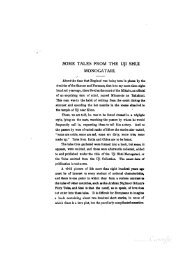Chau Ju-Kua - University of Oregon Libraries
Chau Ju-Kua - University of Oregon Libraries
Chau Ju-Kua - University of Oregon Libraries
You also want an ePaper? Increase the reach of your titles
YUMPU automatically turns print PDFs into web optimized ePapers that Google loves.
138 GHAZNI. 1,31<br />
Note.<br />
Al-Ba?rah, the great commercial port <strong>of</strong> Baghdad and Mesopotamia, lay on the Arabian<br />
side <strong>of</strong> the estuary <strong>of</strong> Al-Bajrah, in other words the Blind Tigris, and was about twelve miles, as<br />
the crow flies, from its bank. Mukaddasi (lOa century) says the town measured three miles<br />
across in its greatest width. The modern village <strong>of</strong> Zubayr now occupies the site <strong>of</strong> old Basra. B<br />
The city was founded in 638 A. D. in the reign <strong>of</strong> Omar. The city <strong>of</strong> Uhullah (the Apologos <strong>of</strong><br />
the Greeks) was on the Tigris at the mouth <strong>of</strong> the canal <strong>of</strong> UbuUah (Nahr-al-Ubullah) which put<br />
it in communication with Basra. See Le Strange, J. E. A. S., 1895, 304, and Land <strong>of</strong> the.<br />
Eastern Caliphate, 44.<br />
Marco Polo {I, 64) speaks <strong>of</strong> the «great city <strong>of</strong> Bastra, surrounded by woods, in which 10<br />
grow the best dates in the worlda. Ibn Batuta, II, 9 and IV, 376 speaks <strong>of</strong> the great abundance<br />
<strong>of</strong> dates at Basra. He says that a honey, called sayalan (^)Lyui), was made at Basra from dates.<br />
Ch6u K'u-fei does not mention Basra, nor does any other Chinese author known to us<br />
either prior to our author or subsequently.<br />
32. 15<br />
GHAZNI {?).<br />
Ki-tz'ihni (± m Ji)-<br />
The Ki>t^'i-ni country is reached from Ma-lo-pa in about an hundred and<br />
twenty stages. The country lies to the north-west, and is exceptionally cold, the<br />
winter's snow not melting until the spring. «This country is surrounded by high 20<br />
mountains, and the city (or wall |^)<br />
is cut out in (the rocks <strong>of</strong> the) mountains.<br />
It is about two hundred U square and is surrounded by water. It has some<br />
two hundred mosques. The <strong>of</strong>ficials and the people all go to the mosques to<br />
pray, which they call c¥u-mm (^ |j^), (Note: some write it shu ^).<br />
«The people are, for the most part, well <strong>of</strong>f, and live in houses five or 25<br />
six storeys high. There is a great deal <strong>of</strong> camel and horse breeding)). «The<br />
people eat cakes, meat, and ju-lo {'^l g§), but little fish and rice»; they also<br />
make use <strong>of</strong> a mixture <strong>of</strong> cow's milk and water as an habitual beverage'.<br />
The king's arms reach down to below his knees. He has an hundred<br />
chargers, every one full six feet high, also some dozen head <strong>of</strong> mules, three 30<br />
(sic) feet high, which, on excursions, he rides alternately with the horses. His<br />
bow pulls several piculs, so that five or seven ordinary men cannot string it.<br />
When he is on horseback, he carries an iron mace weighing full fifty catties.<br />
The Ta-shi and all the people <strong>of</strong> the West fear him^ «The products <strong>of</strong> the<br />
soil are gold, silver, ym-no cloth, gold brocade, camel's hair stuffs in all 36<br />
colours (3l "^ ,|i; ^ J^), engraved opaque glass {^ ^ 1^ J^), liquid<br />
storax, wu-ming-i (^ ig ^) and mo-so stones» ()^ ^ ^Y-

















